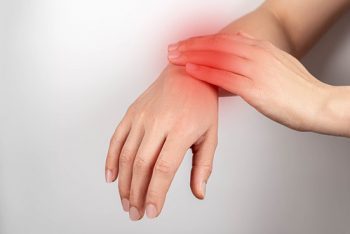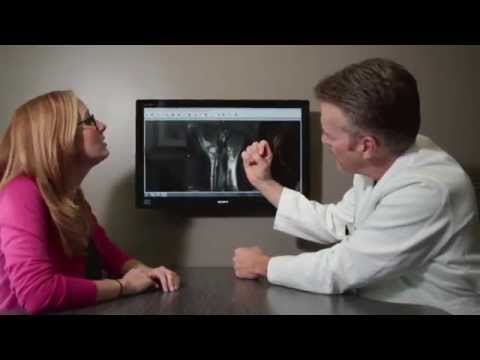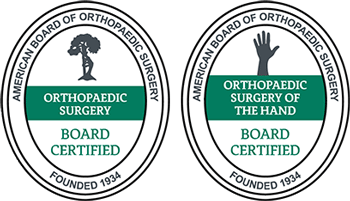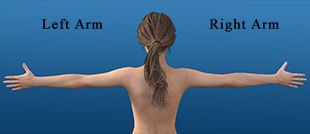Recurrent Carpal Tunnel

“Pain in the wrist, female hands close-up” by wuestenigel licensed under CC BY 2.0
Carpal tunnel syndrome is painful and inconvenient for those who suffer from it. The syndrome causes can disrupt your ability to do daily tasks, perform your job duties, and even sleep peacefully. With diagnosis and treatment from a doctor, both non-surgical and surgical options provide many people with relief from symptoms. However, in rare cases symptoms don’t resolve or they come back after carpal tunnel surgery. Read on to understand the reason this might happen and learn about the ways your doctor will treat a recurrence of symptoms.
What Is Carpal Tunnel Syndrome?
The carpal tunnel is a portion of your wrist’s anatomy. It’s comprised of the wrist’s bones and ligaments that surround the median nerve. The anatomy creates a tunnel that the nerve runs through. The tendons that allow you to move your hand also go through the tunnel. You are able to feel sensation in your thumb, your first two fingers, and half of your ring finger, thanks to the median nerve.
Carpal tunnel syndrome happens when your wrist’s median nerve is compressed. This causes a variety of symptoms including:
- Wrist pain.
- Ringling or numbness in your thumb and first three fingers.
- Hand weakness or clumsiness.
- Reduced grip strength.
- Symptoms that worsen over time.
Healthcare professionals have identified some risk factors for carpal tunnel syndrome. These include your wrist’s anatomy, repetitive hand or wrist motion, medical conditions, and more.
Does Carpal Tunnel Recur?
If you have moderate to severe carpal tunnel syndrome, or non-surgical treatments don’t alleviate your symptoms, surgery is a common treatment. Surgery consists of cutting the carpal ligament to create more room in the tunnel and relieve pressure on the median nerve. This can be done through an incision or via endoscope. It happens as an outpatient procedure with local anesthetic.
While it’s rare for carpal tunnel syndrome to come back after surgery, recurrence does happen in some patients. Some people notice their symptoms coming back after a few months, while others go years symptom-free before feeling pain, tingling, or weakness returning. If you’ve had carpal tunnel release surgery at any point in the past and feel your symptoms return, it’s important to talk to your doctor immediately to investigate the cause.
What Causes Carpal Tunnel To Come Back?
Doctors have identified several reasons the symptoms might come back. One is the formation of scar tissue after the surgery, which can compress the median nerve. Another is swelling at the surgical site, which again compresses the median nerve. In some cases, the nerve was permanently damaged before surgery, so while surgery released the pressure on the nerve some of the symptoms will remain because of the damage. Finally, the original surgery may not have completely released the tendon, which then continues to apply some pressure on the median nerve.
While repetitive motion is not the sole cause of carpal tunnel, it is a contributing factor in some cases. Resuming the same activities after surgery that were causing problems before surgery can lead to some of your symptoms coming back. Additionally, returning to your job before your doctor recommends it can cause post-surgery complications and may affect your ability to heal.
In some patients, carpal tunnel syndrome is only part of the cause of symptoms. In cases like this, you and your doctor will work together to figure out what else is causing your wrist pain. Nerve damage from diabetes and pain from arthritis won’t be resolved during carpal tunnel surgery. Management of your condition may help relieve some of the other symptoms that surgery didn’t address.
What Are the Symptoms of Recurrent Carpal Tunnel?
Recurrent carpal tunnel presents in several ways. For some, the original symptoms of carpal tunnel syndrome never fully resolve after surgery. These patients might continue to feel tingling, numbness, or pain in the fingers and wrist. For others, they experience relief for months or years before symptoms start to come back.
Remember that everyone heals differently. Some patients may not feel relief immediately after surgery, possibly due to post-surgical swelling or slow healing. It isn’t unusual for your symptoms to take a few weeks or months to resolve after surgery. Communicate with your doctor about your healing process and the severity of your symptoms.
How Is Recurrent Carpal Tunnel Treated?
First, proper post-surgical care is key to preventing any complications that might cause future issues. With endoscopic carpal tunnel release, many patients do not need physical therapy to recover from surgery. However, each case is different and if your doctor recommends physical therapy, make sure to do the recommended amount. The open procedure, on the other hand, does often require physical therapy, typically for between four and eight weeks. If your physical therapist recommends you do any exercises or stretches at home, don’t skip them. They are an important part of your recovery.
Non-surgical carpal tunnel syndrome treatments may help alleviate symptoms that return after surgery. Hand and wrist flexibility and strengthening exercises plus ergonomic changes in how you use your hands and wrists may help with symptoms. Ice, warmth, topical treatments, and elevation are all ways Dallas patients have found relief from carpal tunnel pain. Your doctor may recommend a wrist brace that keeps your wrist steady during repetitive movements or while you sleep. If inflammation is the problem, an anti-inflammatory may provide some temporary relief.
Revision surgery is also an option. A second surgery allows the doctor to get a visual of what’s happening with your wrist. If the tendon was not completely released in your first surgery, your surgeon will completely release the tendon during the second surgery.
Your Carpal Tunnel Doctor in Dallas
The Hand and Wrist Institute offers comprehensive treatment options for carpal tunnel syndrome that are tailored to your needs. We’re here to help you find relief from the pain and inconvenience this syndrome causes. Contact our Dallas office to answer your questions or to schedule an appointment. We can be reached via online form or by telephone, and we look forward to helping you improve your carpal tunnel outlook.

























